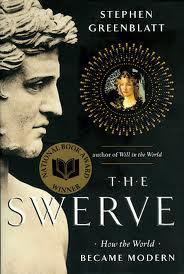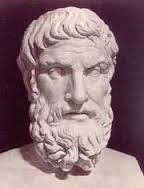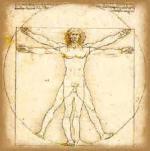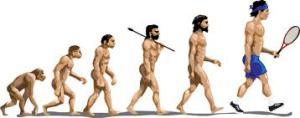 Stephen Greenblatt’s The Swerve centers on a book-length First Century BC poem by Lucretius, On The Nature Of Things; apparently lost (like so much ancient literature) until book-hunter Poggio Bracciolini unearthed a forgotten copy in a monastery in 1417. Greenblatt casts this as triggering modernity’s emergence (the “swerve” of the title).
Stephen Greenblatt’s The Swerve centers on a book-length First Century BC poem by Lucretius, On The Nature Of Things; apparently lost (like so much ancient literature) until book-hunter Poggio Bracciolini unearthed a forgotten copy in a monastery in 1417. Greenblatt casts this as triggering modernity’s emergence (the “swerve” of the title).
I’ve also perused the poem itself, which Greenblatt deems a literary masterpiece. Maybe its poetic virtues didn’t survive W. E. Leonard’s translation from the Latin. It helped greatly to have first read Greenblatt’s lucid bullet-point distillation (further distilled below).

Imaginary portrait of Lucretius. No real one exists
The poem presents a bracingly materialist view of reality and the human condition which, though rooted in the philosophy of Epicurus, even earlier, is indeed very modern, and undermined the reigning Christian thought system. But Greenblatt overstates his case that Lucretius was central to the latter’s retreat. The Renaissance was sparked by a great complex of factors, which actually gathered force gradually over a long interval; intellectual ferment was fizzing all over; Lucretius’s rediscovery fed into this but was hardly, by itself, seminal.

And if Lucretius still isn’t exactly a household name, nor was he in Roman times. While his book did enjoy some circulation among the cognoscenti, he lived and died in relative obscurity — probably because few contemporaries could have made sense of a work profoundly incompatible with then-conventional ideas.
Someone in my book group mocked things Lucretius got wrong. But I was blown away by how much he got right — considering that he predated any proper science, with human understanding of the world being a mess of clueless superstition. Lucretius could only use his reasoning mind and his observation of reality to intuit its underpinnings:

The particles don’t move by predetermination in straight lines, but sometimes “swerve,” causing collisions and recombinations; and that indeterminacy is what gives us free will. (I have similarly suggested that at the molecular level brain activity entails quantum mechanical effects, inherently unpredictable, hence true determinism is impossible.)


Space and time are unbounded, with no beginnings or ends — and never a creator or designer. Such beings as gods, if they exist (Lucretius doesn’t say otherwise) couldn’t possibly care about you or the minutiae of human affairs.
All religions are superstitious delusions, built on primal fears and longings. They always embody the cruelty of retribution fantasies (Hell) and human sacrifice, symbolic or otherwise.

There is no cosmic purpose to existence, and no afterlife. (Lucretius spends pages deconstructing the nonsensicality of belief in a “soul.”) But since you won’t be around to experience nonexistence, it shouldn’t faze you. And this life being all we have, there is no higher ethical imperative than maximizing pleasure* and minimizing pain. All others — serving the state, glorification of God, pursuing virtue through self-sacrifice, etc. — are secondary, misguided, or fraudulent. The greatest obstacle to pleasure is not pain, but delusion.
None of this is cause for despair. To the contrary, understanding these realities is crucial for the possibility of happiness. To fantasize some higher reality, to aspire toward, only puts people in a destructive relation with the environment they actually inhabit. But by looking calmly at the true nature of things, we can experience a more genuine awe, and achieve a more genuine fulfillment.

Taking a cynically dim view of humankind is common among intellectuals. But I am proud of my species. And learning about this man who, so long ago, could achieve such insight — it often gave me goosebumps — redoubles that pride.
* By “pleasure” Lucretius, following Epicurus, doesn’t mean hedonism. Rather, it really means the enjoyment derived from living a fulfilling life.
